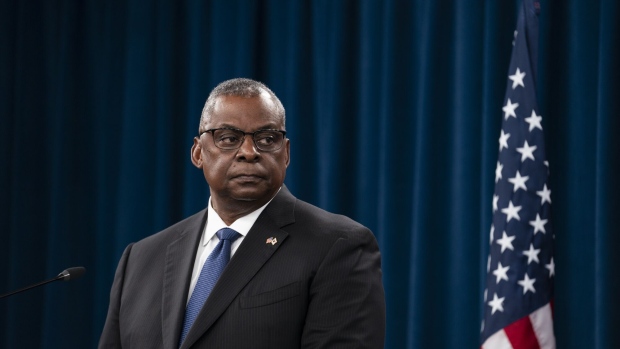Feb 12, 2024
Pentagon Chief Austin Goes Under Anesthesia to Treat Bladder Issue
, Bloomberg News

(Bloomberg) -- Defense Secretary Lloyd Austin was put under general anesthesia for a procedure to address a bladder problem, his doctors said, as concern continued to swirl around his heath after his second hospitalization in a month.
Austin, 70, “underwent non-surgical procedures under general anesthesia to address his bladder issue,” according to a statement from his doctors at Walter Reed National Medical Center, where he was admitted late Sunday. It said a “prolonged hospital stay is not anticipated.”
Austin’s doctor and the Pentagon declined to provide more information, though Pentagon spokesman Pat Ryder said the bladder problem wasn’t related to the prostate-cancer treatment Austin received in late December. Austin was later hospitalized for two weeks in January over complications from that surgery, an episode that touched off a furor because he didn’t disclose it for several days.
Austin has transfered his duties to Deputy Defense Secretary Kathleen Hicks and canceled a trip to Brussels to meet other defense chiefs. Even so, his staff and doctors sought to play down his most recent hospitalization, saying he would be able to return to the office soon.
Austin hasn’t spoken to President Joe Biden about his latest health issue, according to National Security Council spokesman John Kirby. When asked about if the president has any concerns of his ability to serve he said, “Not at all.”
Austin was released from his initial hospitalization on Jan. 15 after about two weeks. He later apologized for his secrecy around the illness, including his failure to notify Biden of his cancer diagnosis for several days. He returned to work at the Pentagon on Jan. 29 for the first time in almost a month.
The secrecy set off criticism from Congress as lawmakers demanded explanations from Austin. The Pentagon’s internal watchdog said it would investigate whether the Defense Department’s procedures are sufficient to ensure appropriate notifications and transfer of authority if a senior leader falls ill.
Austin’s January hospital stay drew particular attention because it occurred while US troops and commercial shipping faced attacks from Iran-backed militants in the Middle East, including Houthi rebels in Yemen who have been targeting vessels around the Red Sea. A day before Austin returned to the Pentagon, three US service members were killed at an outpost in Jordan that Biden blamed on Iranian-supported groups.
©2024 Bloomberg L.P.


